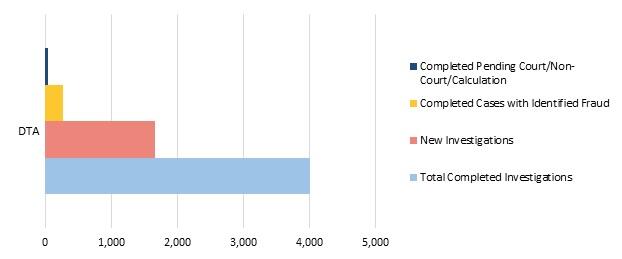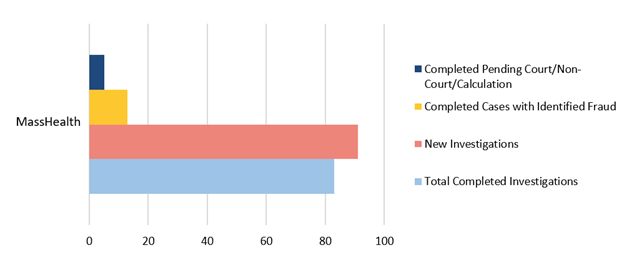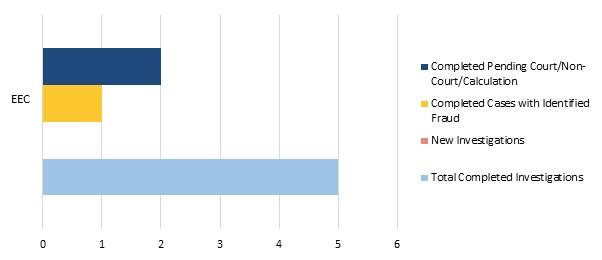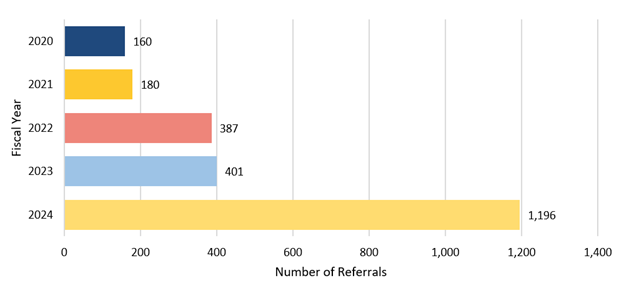Central Processing Unit
CPU received 3,155 new referrals for investigation in FY24 and processed, analyzed, and reviewed 6,534 referrals from the following sources.
Table 2. FY24 CPU Referral Sources
| Source | Number of Referrals | Percentage of Total* |
|---|---|---|
| DTA | 4,998 | 76.5% |
| Hotline | 1,457 | 22.3% |
| MassHealth | 35 | 0.5% |
| PCA Task Force | 35 | 0.5% |
| Task Force | 8 | 0.1% |
| Law Enforcement | 1 | 0.02% |
* Percentages do not total 100% because of rounding.
The following is a breakdown of the public assistance programs involved in the 6,534 analyzed referrals.
Table 3. FY24 CPU Caseload by Public Assistance Program
| Type | Number of Cases | Percentage of Total* |
|---|---|---|
| Supplemental Nutrition Assistance Program | 5,416 | 82.9% |
| MassHealth | 513 | 7.9% |
| Transitional Aid to Families with Dependent Children | 380 | 5.8% |
| Emergency Aid to the Elderly, Disabled and Children | 106 | 1.6% |
| Other | 59 | 0.9% |
| Merge Case13 | 42 | 0.6% |
| Personal Care Attendant | 16 | 0.2% |
| EEC | 2 | 0.03% |
* Percentages do not total 100% because of rounding.
CPU team members identified 3,102 referrals as potential IPV cases, where BSI determined that a fraud allegation had merit but returned the case to the DTA for further action based on the evidence. Typical agency actions include civil recovery, disqualification, and recalculation of benefits. Additionally, CPU closed or merged 1,827 referrals administratively where no fraud was determined after completing preliminary investigations. CPU designated 1,605 referrals for active investigation. CPU team members continued to carry a small caseload individually, in addition to the work described above, completing 83 investigations within the unit.
In FY24, CPU hired a new fraud examiner, expanding the team to six (6) employees. The team now consists of an assistant director, a program matter subject expert, two (2) senior fraud examiners, a fraud examiner, and a staff analyst/specialist. The new team member was trained and onboarded to support CPU’s day-to-day operations. In addition, CPU members assisted in onboarding nine (9) other new BSI employees and two (2) BSI interns during FY24.
CPU team members are in direct contact with the public and stakeholders. CPU handles referral intake calls and manages the online referral process. These types of referrals are categorized as hotline referrals. In FY24, CPU completed the intake process for 1,40414 hotline referrals. Additionally, the CPU team regularly assists members of the public and guides them to the appropriate agency to handle their requests.
CPU also communicates and collaborates as a team to assist examiners during their investigations. As a team, CPU uses various technical resources to stay current with guidelines and to verify allegations received. As a result, CPU continuously updated examiners throughout FY24 regarding any changes to the policy/income guidelines in connection with the public benefit programs and other guidance from our stakeholders.
Fraud Investigations Unit
The Fraud Investigations Unit (FIU) consists of a special investigator, seven fraud examiners, and one senior fraud examiner, all under the supervision of an assistant director and three supervising fraud examiners.
FIU completed 650 cases in FY24, which contributed to identifying fraud totaling $6,913,203 in 485 cases. The breakdown of identified fraud by public benefit program in FY24 is as follows:
- $4,629,006 for Supplemental Nutrition Assistance Program (SNAP) investigations (67%)
- $1,543,079 for MassHealth investigations (22.3%)
- $358,026 for Transitional Aid to Families with Dependent Children (TAFDC) investigations (5.2%)
- $265,413 for EEC investigations (3.8%)
- $82,099 for Emergency Aid to the Elderly, Disabled and Children (EAEDC) investigations (1.2%)
- $35,578 for Personal Care Attendant (PCA) investigations (0.5%)
During FY24, FIU completed 18 civil recoveries, totaling $447,605 in fraudulent overpayments. The BSI civil recovery process includes the reporting examiner initiating contact with the subject, scheduling a meeting with the subject either in person or virtually, and ultimately reaching a repayment agreement to recover the overpaid benefits. Subsequently, signed documents are sent to the respective benefit agencies to begin the collection process.15
BSI continued to follow the federal directive from the Centers for Medicare and Medicaid Services,16 which prohibits MassHealth from collecting overpayments from its members. Completed MassHealth investigations with financials (overpayments attributed to member benefit fraud) are returned to the agency for their records. This does not impact BSI’s investigative collaboration with MassHealth and AGO in the PCA Task Force (PCA TF) on PCA fraud-related cases. TF examiners provide investigatory support for active PCA TF cases in addition to handling a regular caseload of other benefit fraud investigations.
During FY24, FIU had three hiring rounds, adding seven (7) fraud examiners to the team. All new hires receive a two-week onboarding training held both virtually and in person. Training sessions were hosted by various members of BSI, allowing for interaction with all staff members. Current BSI members continually update onboarding materials to include current information and best practices. The onboarding agenda consists of multiple PowerPoints, job aids, videos, and templates. All onboarding materials are stored in the public drive for continuous access; they remain valuable guides for reference.
Figure 4. FY24 DTA Caseload
Note: BSI’s DTA caseload for FY24 included SNAP, TAFDC, and EAEDC cases.
During FY24, FIU’s caseload featured case assignments from referrals generated through the PCA High Earner project. The consistent finding in these cases with identified fraud is that DTA cash and SNAP benefit recipients failed to report their receipt of PCA income to DTA. Completed PCA cases with identified fraud were returned to DTA as IPVs for their administrative process and overpayment recovery. BSI civilly recovered $215,101 in public benefits issued to PCAs who failed to report their PCA income to DTA.
Figure 5. FY 24 MassHealth Caseload
Note: BSI’s MassHealth caseload for FY24 included member health benefits and PCA cases.
During FY24, BSI case assignments included a variety of member-benefit and PCA fraud cases. BSI and AGO worked to improve the referral intake and review process for joint investigations of PCA fraud-related cases. In PCA investigations, we make determinations regarding allegations of billing for services not provided, which often involves verifying outside employment that would hinder or interfere with a PCA’s ability to perform PCA duties.
BSI also investigated whether PCAs who received other public benefits accurately reported their earned income to these public benefits programs. These investigations identified PCAs who failed to report their PCA income and were overpaid for other public benefits.
Figure 6. FY24 EEC Caseload
Lastly, FIU completed five EEC investigations and identified $284,677 in fraud. Because individuals suspected of defrauding EEC often also receive other forms of public assistance, BSI routinely checks whether they receive other public assistance benefits, and verifies particularly, their reporting of household income and composition to other agencies. These supplemental investigations often discover additional errors or fraud in DTA and MassHealth public benefit programs.
As part of BSI’s expanding working relationship with EEC, BSI examiners participate in EEC’s administrative hearings under the Informal Fair Hearings Rules provided by Section 10.11 of Title 606 of the Code of Massachusetts Regulations. The EEC administrative hearing provides BSI examiners the opportunity to explain their investigations and findings to EEC review officers.
Data Analytics Unit
BSI’s DAU generated 1,196 referrals for CPU analysis in FY24. In the majority of these referrals, CPU found that PCAs failed to accurately disclose their income to DTA and MassHealth as required while receiving public benefits.
DAU also identified and generated referrals for seven MassHealth providers. The analysis focused on improper billing associated with a variety of dental services. Other analyses conducted by DAU in FY24 focused on vision care services, home health agency services, PCA services, durable medical equipment, laboratory, and behavioral health services. DAU also continued to receive referrals from BSI’s Public Assistance Fraud Hotline. During FY24, DAU received and analyzed 10 provider referrals made through the hotline, some of which are currently ongoing.
DAU continued the development of its Analytical Support Services. DAU’s Analytical Support Services allow BSI examiners to choose from a suite of services designed to aid in the completion of data analysis tasks associated with their investigations. Some of these services include the creation of visualizations (maps, timelines, charts, graphs, etc.) for presentation in court and other settings; custom findings reports for the analysis of financial, healthcare, and other relevant data; network and social analysis; technical training; and Optical Character Recognition (OCR) services. In FY24, DAU received, processed, and completed five Analytical Support Services requests. Among the services provided, highlights included processing bank records through OCR and analyzing the output, processing activity log records through OCR and analyzing the results, creating visualizations from various data sources, analyzing financial records and electronic benefits transactions (EBT), and providing training assistance to other units. By collaborating with examiners and completing these requests, DAU streamlined investigations by automating otherwise manual processes and summarizing vast amounts of information into a more easily digestible format.
During FY24, DAU remained focused on the overall development of its OCR and spatial analysis capabilities and the expansion of their respective use cases. DAU continued making strides in automating the processing of certain investigatory documents using OCR. Building on the work completed in FY23, which included the successful automated processing of financial records related to eight different bank account types from various financial institutions, DAU successfully processed records associated with these institutions using this new capability. These financial records only pertain to BSI’s public benefit fraud investigations.
Additionally, DAU continued to make headway related to the automated processing of tax documents. The Department of Revenue Form 1 summary, which DAU developed last fiscal year and passed multiple quality checks and a proof-of-concept stage, became production-ready in FY24. Similarly, the summary of healthcare information, known as Schedule HC, also became production-ready across multiple tax formats. These advancements are critical to improving the efficiency and effectiveness of our work by automating BSI’s tax transcription process during fraud investigations.17 DAU’s also made progress related to the automated processing of PCA timesheets during FY24. DAU now processes the timesheets for one Fiscal Intermediary (FI),18 Tempus,19 regularly without issue. This supported further advancement of our ongoing work related to mapping and visualizing the travel records of PCAs and other Medicaid providers, including spatial analysis.
DAU’s continued efforts to enhance and further develop the Analytical Support Services program have expedited the investigative process and streamlined certain operational functions within BSI. By utilizing these services, examiners and other units within BSI have decreased investigatory time by reducing or eliminating manual processes. Additionally, these services provide BSI additional options in how information is processed, summarized, and presented during the investigative process.
DAU continues to support multiple state and federal partners through joint investigative work, in addition to accepting referrals for investigation and creating and sending referrals to the appropriate entities. For example, DAU is collaborating with federal partners, including the federal Office of the Inspector General for Health and Human Services on an ongoing analysis related to services provided within both the Medicaid and Medicare programs.
Figure 7. FY Totals for DAU-Generated Referrals
Other BSI News
During FY24, BSI’s training team, comprising staff members from all units, continued identifying staff training needs; created informative and engaging training, presentations, and job aides; and effectively led training sessions for all BSI staff members. The training team continues to refresh BSI’s training content—which consists of multiple presentations, job aids, and learning templates—to reflect up-to-date federal poverty limits and any updated benefit program information. Onboarding materials serve as useful guides and remain available for all BSI staff members to reference.
The training team also assisted with a considerable update and redraft of BSI’s Policy Manual, the first since 2012. In addition to aligning the manual with BSI’s current investigatory process, commonly used terms, applications, and systems were updated, and reporting requirements are now included.
BSI initiated 19 repayment agreements and disqualification consent agreements (DCAs), totaling $478,731, during FY24. DCAs are agreements that subjects voluntarily sign to disqualify themselves from receiving further DTA and/or EEC benefits for a specific period of time because of IPVs. When pursuing civil recovery for DTA and EEC cases, DCAs are required as part of the civil recovery agreement.
BSI’s new case management system (CMS) project worked through its final phase, Phase III, during FY24. The new CMS is a platform where all staff members can access a full case file without physically requesting information from the assigned examiner. The CMS has enhanced the process by which BSI employees assign cases, request and save documents, request tasks, track case progress, log financials, and generate reports of investigations. Information requests and information-gathering tasks are assigned and tracked through the CMS and reports are generated within the CMS rather than in separate Word documents.
The ability to push the “Enter” button to navigate information searches within the CMS has greatly improved the user experience. Another upgrade completed during Phase III was the addition of subfolders in the “Documents” tab, allowing examiners to organize their files more efficiently within a case. While Phase III is wrapped up, BSI continues to consider other system improvements that may enhance user-friendliness, efficiency, and satisfaction. Potential system improvements include the ability to bulk fast-track from certain workflows, fast-tracking to the assignment queue instead of a specific examiner or assistant director, and a separate tab/list for cases in calculation status.
| Date published: | January 30, 2025 |
|---|



